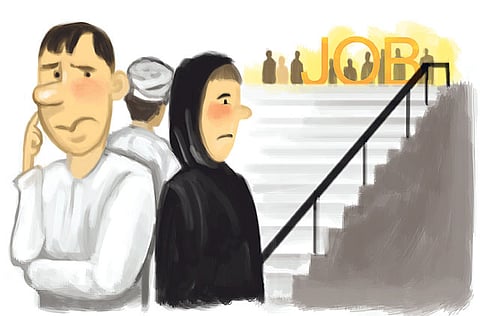UAE must harness its national workforce
Too many of the country's young people are not contributing as much as they could

The cultural movement has regressed in Arab societies. Many scholars and thinkers have tried to discover a way out of this dilemma, which is apparent despite the economic, social and political development.
The intentional whittling away of the middle class, pursued by different parties with various agendas, is one reason for this cultural retreat. Many writers have stopped publishing, which is a phenomenon that deserves to be studied.
The current realities of life has resulted in most writers and intellectuals thinking in terms of increasing their income by investing in stock markets or pursuing other economic activity.
The general perception was that an increase in the number of those holding higher degrees would lead to an increase in intellectual contributions.
However, that did not happen. In fact, the opposite is true. During the past few years, especially in the UAE, there has been an exodus of intellectuals from the cultural arena.
Interest in attending seminars and conferences has diminished. Few attend these functions beyond the first day.
Hopes are high for the resumption of cultural life during Ramadan, but these hopes may only be dreams.
Key role
Many studies focus on the importance of civil society establishments and their role in development, as witnessed in western countries.
However, one is puzzled about the role of the ministries of education and culture in promoting these establishments and organisations, as they require endorsement and support.
During the first decade of the federal state, the enthusiasm of key officials for the emiratisation process was clear. As a result, federal and local departments set out to attract, recruit and employ UAE nationals, especially those holding higher degrees.
However, enthusiasm cooled gradually, to the extent that, today, nationals must compete with foreigners, which is a tragedy. At the same time, we find that foreigners strive to find jobs for their compatriots.
Idle hands
The problems of youth have increased because of excess leisure time. Those who are supposed to continue the development process are idle.
Road accidents claim significant numbers of lives and this generation has no ambitions, although attempts were made to make use of their abilities.
This may be a dark vision, but it is justified by our concerns regarding the future.
Hence, the media have to focus on those who work seriously to serve their country, while simultaneously improving their conditions.
In the past, there was growing concern over the fact that 30,000 nationals were unemployed. The UAE government tried to solve the problem by employing these people, and national banks contributed also.
Surprisingly, only four per cent of private-sector employees are nationals, and the majority of those employed are non-Arab Asian nationals.
Consumer communities do not produce productive generations, but they do create a generation that searches for the easiest shortcuts to obtain their needs. The situation may lead to a growth in extremism.
Social activity is no longer tangible and university enrolment rates have dropped, especially among males.
We need to wake up to the dangers this scenario poses to the development process in a country that needs to make use of its entire workforce — of both genders. Nevertheless, the numbers of those who are unemployed are on the rise, despite the higher-education degrees they hold.
Dr Mohammad Abdullah Al Mutawa is a professor of sociology.


